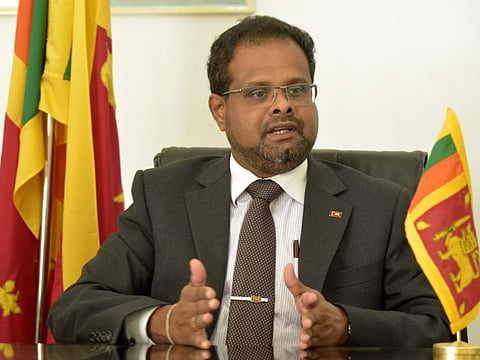Sri Lankans urged to register for welfare protection
70th Independence Day celebration of Sri Lanka today, community celebrations on February 9

Dubai: The Sri Lankan Consul-General in Dubai has urged Sri Lankans who haven’t yet registered with the foreign employment bureau back home to register with the labour office at the consulate to ensure their welfare is protected.
Sri Lankans leaving for work abroad must go through proper government channels prior to their departure, according to the Sri Lanka Bureau of Foreign Employment (SLBFE) Act No. 21 of 1985 as amended by Act No. 4 of 1994.
The registration with SLBFE comes with a fee that provides workers the necessary insurance cover and benefits should a problem occur overseas like critical illness, sudden death, disability, job loss, among others.
Consul-General Charitha Yattogoda said the registration is for the workers’ own good.
“To be considered as a legal migrant worker, they should register with the SLBFE prior to departure,” Yattogoda told Gulf News.
“The blue-collar sector is not allowed to leave the country without registering first. There are certain restrictions imposed on them, particularly those serving in the domestic sector and so on. For professionals, the strict requirements are not imposed [prior to departure] but everybody is encouraged to register,” he added.
The comments came ahead of the 70th Independence Day celebration of Sri Lanka on February 4 and the 25th anniversary of the establishment of the Consulate-General of Sri Lanka in Dubai. A dinner reception will be held on the day and a community-wide celebration will be held at Zabeel Park on February 9 for the Sri Lankan Day 2018.
An estimated 250,000 Sri Lankans live and work in the UAE, majority of whom are in Dubai. Some 25 per cent are working in blue-collar jobs while the rest work in the hospitality, health care, aviation, banking and education sectors.
Although they encourage all Sri Lankans to enter the UAE on an employment visa, there are those who still come on a visit visa and find employment here like other nationalities. But they should not fail to register themselves.
Yattogoda said the consulate extended assistance to 1,018 Sri Lankans who were in need in 2017. It also repatriated a total of 415 of its nationals.
“In our case, we don’t have an exact fund as such but we have a different system where we request workers to register under the SLBFE, then they have cover under that,” Yattogoda said.
“Other than that, depending on the case, the government decides the best course of action. Our policy is, whenever they need our assistance, we have to help them. There are certain situations where we cannot help, for example, if they defaulted on a loan or a payment. But still, within our limitations, we always facilitate,” Yattogoda explained.
Yattogoda said they make ways and collaborate with different partners to help their people such as the Sri Lanka Welfare Association, Sri Lankan Airlines, and hospitals.
Yattogoda said the consulate is open from Monday to Friday every week to accommodate everyone.
“Community service is one of our priorities. That’s the reason we are open on Fridays as a regular working day,” Yattogoda said.
Meanwhile, the two sisters, who survived a family suicide attempt in August in Sharjah, are now stable and are awaiting repatriation.
A Sri Lankan man jumped to his death on August 29, which led to the discovery of the bodies of his wife and son who died in an apparent family suicide bid in a hotel apartment. The two sisters, however, survived.
“They are completely okay. They are in a shelter under the support of the UAE government and are being taken care of. The case has not been concluded. We hope that within a short period of time, everything will be sorted out and we’ll be able to send them back to Sri Lanka to their relatives.”
How to register with foreign employment bureau
Visit the labour section at the consulate.
Bring a copy of the labour contract or offer letter. Pay Dh385 registration fee that is good for two years with the same employer.
Benefits: Welfare benefits locally and overseas — maintenance of safe houses for distressed female workers, repatriation of distressed workers, insurance coverage, legal assistance for needy workers, scholarship for migrant workers’ children, loan at low interest etc.
Sign up for the Daily Briefing
Get the latest news and updates straight to your inbox



